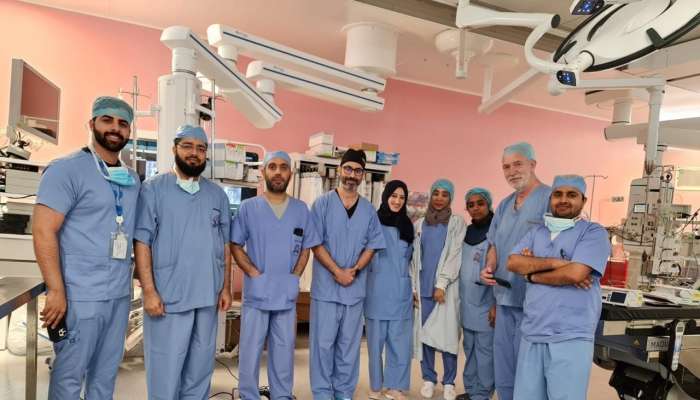
Muscat: A specialised team, from the Department of Interventional and Structural Cardiology at the National Centre for Cardiac Diseases and Surgery at the Royal Hospital, was able to treat a very complex heart disease using modern technology.
They used a temporary pump to support the left ventricle to stimulate coronary and general blood circulation, and it was implanted cathetrically from the femoral artery.
The surgery was performed by a medical team headed by Dr. Hatem bin Lutfi Al Lawati, a senior consultant physician in the interventional and structural cardiology, and Dr. Khaled bin Humaid Al Saeedi, a consultant physician in interventional and structural cardiology, with an integrated team of the anesthesia department, technical and nursing teams of the catheterisation laboratories at the centre. The surgery took approximately two hours.
The patient was diagnosed with advanced atrophy compromising the pumping efficiency of the left ventricle, a dangerous increase in pulmonary vascular resistance, and blockages in all major coronary arteries due to dense fatty and calcified deposits in the tiny blood vessels. Due to the progression of the disease to advanced stages, the option of surgically implanting and connecting the coronary arteries was a risky option.
The medical team implanted the booster pump - the iVAC 2L device - in the left ventricle, then broke up the dense calcifications causing narrowing of the main coronary artery, followed by implanting a number of modern mesh stents. The patient remained in a stable condition throughout the catheterization procedure and in the post-catheterization period and left the hospital the next day.
Such a successful catheter operation constitutes a qualitative leap in the treatment of the increasing cases of patients with atherosclerosis of the coronary arteries, which are accompanied by atrophy or severe morbidity as a result of ischemia, that are difficult to treat with conventional methods, whether by catheter or surgery.
Such modern technologies, combined with the expertise of the medical staff at the National Centre, also open the way for treating other complex cases in the field of valve diseases and ventricular electrical activity disorder, providing hope for recovery from complex heart diseases for which there was no surgical or catheterization option available before.
--